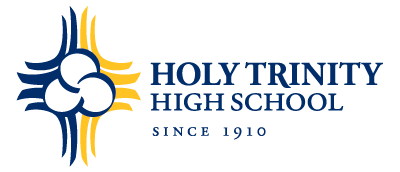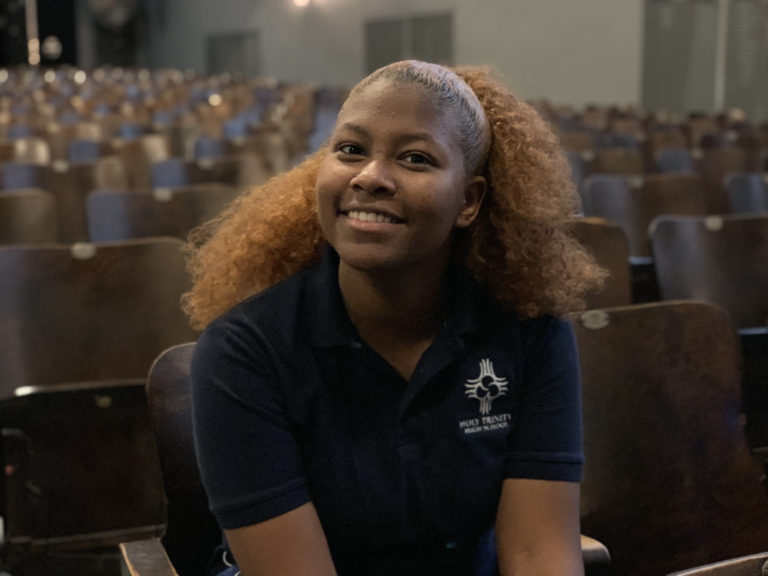Over the last five years, Holy Trinity has developed a new, bold strategic plan to increase our students’ ACT scores, college acceptances and scholarship opportunities.
With spring around the corner, Holy Trinity students are focusing on college—and not just the seniors. While the Class of 2018 is eagerly awaiting college admissions letters (and incoming letters have already included Wellesley College, University of Michigan, St. Edward’s and many more high-achieving schools), the Class of 2019 is setting their sights on the ACT exams.
Over the last five years, Holy Trinity has developed a new, bold strategic plan to increase our students’ ACT scores, college acceptances and scholarship opportunities. “We know that the higher their scores, the better the opportunities: the better the schools they can get into, the more scholarships for both their first and second choice schools,” says Principal Marianne Lynch. “We want them to have those choices. To improve those choices and the financial backing they need, test scores count.”
Our new strategy incorporates three important components: incorporating test-taking skills in the classroom for all four grades, providing every student with the opportunity to participate in an extracurricular ACT preparatory program, and shifting the culture of our school community to build the expectation that every student will prepare for and take the ACT exam.
Embedding Skills
“We know that not all of our students test as well as they perform, so one of our concerns is how to get their test scores to better reflect their abilities and actual performance,” says Mrs. Lynch. One of the most effective ways to reach that goal is to equip students with the skills they need to be successful on standardized tests. “These are also skills that are useful in what students do day-to-day,” adds Mrs. Lynch.
This strategy begins with our freshmen and is happening across all disciplines. For example, the freshmen science classes focus on reading and analyzing data, which is fundamental to the science portion of the ACT. As students advance to their sophomore and junior years, science teachers are regularly incorporating ACT practice questions and segments into their curriculum. These exercises are especially helpful for students who historically perform well in class but struggled to translate that knowledge into the format required in the test. Now, the practice activities are training students to better meet the test’s requirements.
Similarly, in the English department, embedded skills begin in freshman-level classes with work on reading. Sophomore classes focus on vocabulary, particularly the 100 most commonly used words in the ACT, while junior courses focus on reinforcing grammar and writing skills, which are essential in the ACT.
To further boost this strategy, three years ago, Holy Trinity implemented a building-wide focus on improving reading comprehension. “You can’t do well on a summative test, such as the ACT, if you can’t read the questions correctly,” explains Mrs. Lynch. “That can be an issue in math and science as well as reading. To help our students reach their full potential, in the test and beyond, we know that reading comprehension is key.”
“Our ACT results have been improving every year, and we think that’s part of our reading strategy,” she adds. “That’s what we want: Slow and steady growth that reflects lasting change.”
Beyond the Classroom
Providing extra support for ACT prep isn’t new for Holy Trinity. Over the years, the school has offered programs through outside organizations as well as creating voluntary programs taught by Holy Trinity teachers. What is new is the depth and breadth of the programs we are now offering.
New this year, we are offering Academic Approach to 40 students, thanks to federal funding. Used by many area scholarship organizations and high-performing high schools, Academic Approach has a proven record in raising students’ test scores through an individualized and small group approach.
In addition, we are once again offering the prestigious ACT UP! program, open to students with a 3.0 or higher grade point average. This year, 29 students are participating, thanks to the generosity of our donors.
Because Academic Approach and ACT UP! both require students to apply and attend after-school and weekend sessions, the administration intentionally provided a third choice: Apex Learning, a digital curriculum open to any interested juniors.
Through this strategic mix of programs, we are now able to provide support for every single student in the junior class.
A Culture Shift
The strategy is only half of the story. To see long-term success, the administration recognizes that students need hope for their future and to envision college as critical to their long-term success. As a school, Holy Trinity has been focused on defining college as an expectation for each of our students. In recent years, we have re-imagined our class offerings to become a truly college preparatory curriculum, significantly increased our honors and AP offerings and increased our graduation requirements to reflect college entrance standards.
We’re now seeing those results. “Our parents understand how important these programs are for their student’s success and the types of doors that can open with a strong test score, and they are advocates for their students to opt-in to our ACT offerings.”
Simultaneously, we are seeing a shift in our student body. Junior Kyuante Coleman, an ACT UP! participant whose goal is to attend a prestigious college and major in business or engineering, says there’s no doubt in his mind that college matriculation is a driving culture at Holy Trinity. “Teachers really push for it. They’re always telling us in class, this project is going to help you in college, these note-taking skills are going to help you in college, taking this AP class will help you with your college resumes. My first two months of this school year were basically about preparing for college. College is definitely in my path. Yes, ACT UP! is a lot of extra time and work, but it’s worth it to get into the best college that’s offered to me.”
“To see success on the ACT test scores and therefore in college,” says Mrs. Lynch, “it’s up to the students to put in the extra work outside the classroom, which takes self-discipline and a goal-oriented mindset. By shifting our school culture, we are seeing a strong increase in the number of students who are following through and taking these opportunities seriously.”
Kyuante agrees: “When I talk about the ACT and college with my classmates, we will first wish each other good luck. Then we discuss what’s our strategy and how we can help each other out with the different sections on the ACT. The conversation isn’t about should we or shouldn’t we take the ACT—we are all going to take it. The conversation is about helping each other succeed.”
While some colleges and universities have become test optional, test scores and grade point averages will continue to be the primary measures by which higher education sorts candidates. We want to ensure that our graduates continue to rise among the pool of candidates competing for college seats and dollars, and the pathway to a bright future.



